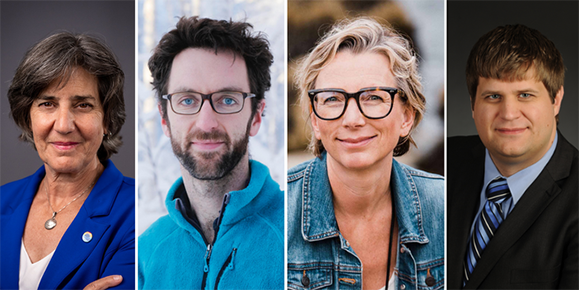For years, the ocean has played a crucial role in slowing climate change, holding 90 per cent of the heat we produce and absorbing 90 per cent of carbon globally. Dalhousie alum Dr. Will Burt (PhD’16) believes it can do much more.
Dr. Burt is chief ocean scientist at Dartmouth-based Planetary Technologies. The company is exploring whether adding alkaline material to the ocean will enable it to remove a gigaton of carbon from the atmosphere by 2035. Dr. Burt is not only drawing on his Dalhousie training to see how well this approach can work, but also the university’s world-renowned researchers.
“Dalhousie has considerable depth in the realm of ocean-related research,” Dr. Burt says. “We rely heavily on their researchers for independent assurance that what we are doing is appropriate, that the data is high quality and that the results we are seeing are real.”
Dr. Burt is one of the ocean research panelists participating in Dalhousie’s Apr. 20 Open Dialogue Live: “Accelerating ocean research at Dalhousie.” This free and open in-person and online event will offer insights as to how Dalhousie researchers and partners are working to preserve the ocean’s health as they bring it to the centre of global climate action.
Dr. Anya Waite, scientific director and CEO of the Dalhousie-based Ocean Frontier Institute, will moderate the event. She says that the big challenge in addressing climate change is uncertainty as to how well the ocean is functioning in removing carbon from the atmosphere.
“We don't have the necessary data to understand how extreme events, such as melting glaciers in the Arctic, could completely change how much carbon the ocean is able to absorb,” says Dr. Waite, who is also associate vice-president of research (ocean) at Dalhousie.
“Dalhousie is looking at how we can get that data, which will enable us to explore ways to enhance the ocean’s ability to absorb carbon and help communities and organizations that rely on the ocean in adapting to climate change,” Dr. Waite says.
More data, more impact
Another Open Dialogue Live event panelist, Dr. Katja Fennel, is making progress in collecting this data. Using Canada Foundation for Innovation funding, her team is deploying data collection devices in the Labrador Sea and Scotian Shelf so that they can develop more accurate models of changes occurring in the region. She will share insights with the audience on her efforts, which will be crucial in validating the vital marine-based carbon dioxide removal technologies that companies like Planetary Technologies are working on.
“In Canada, there is more emphasis on land-based methods for mitigating climate change, such as planting trees,” says Dr. Fennel, departmental chair and professor at the Department of Oceanography. “While I fully support efforts in ecosystem restoration, those will not be enough and typically do not result in permanent carbon removal. I believe Dalhousie is well positioned to drive forward efforts in marine carbon dioxide removal and deliver the expertise that is needed to determine whether they are safe and effective.”
University-wide effort
As Dr. Fennel gathers more information from the ocean, panelist Dr. Mike Smit, acting dean at the Faculty of Management and professor at the School of Information Management, is developing systems to make such data readily accessible for researchers to analyse and use. He sees his work as illustrative of how Dalhousie’s commitment to excellence in ocean research engages experts across the university. He’s looking forward to hearing from the other panelists and taking audience questions to help further understanding of ocean research.
“We have engineers developing data collection devices, education specialists looking at how to best share climate information with the public, and policy experts exploring how the science will inform policy,” says Dr. Smit, who is also the deputy scientific director of the Ocean Frontier Institute. “The ocean impacts almost everything we do, so it’s not a surprise that, across virtually all our faculties, there is some connection to ocean research.”
Through cross-department collaborations, Dr. Smit believes that Dalhousie will not only cement its reputation as a world leader in ocean research, but also make real progress in addressing climate change.
“Given recent news, it is easy to feel discouraged and wonder what can be done,” he says. “But there is exciting work taking place at Dalhousie that has the potential to find solutions. I’m looking forward to sharing that at this event and I hope everyone who joins us will feel encouraged by what we are doing.”
Open Dialogue Live: Accelerating ocean research at Dalhousie happens Thursday, April 20, 2023 at the Steele Ocean Sciences Building Atrium, 1355 Oxford Street, Halifax. It will be streamed simultaneously online. Registration is free but required for both in-person and online attendance.
Panelists will include:
- Dr. Mike Smit, acting dean at the Faculty of Management and professor at the School of Information Management
- Dr. Katja Fennel, department chair and professor, Dalhousie’s Department of Oceanography
- Dr. Will Burt, chief ocean scientist at Planetary Technologies
The event will be moderated by Dr. Anya Waite, scientific director and CEO of the Ocean Frontier Institute, and associate vice-president of research (ocean) at Dalhousie.

Left to right: Anya Waite, Will Burt, Katja Fennel and Mike Smit.

